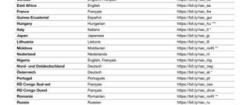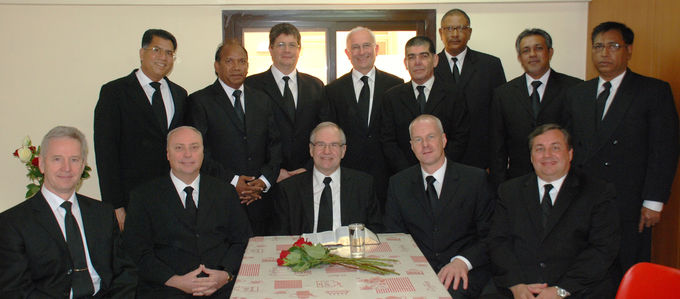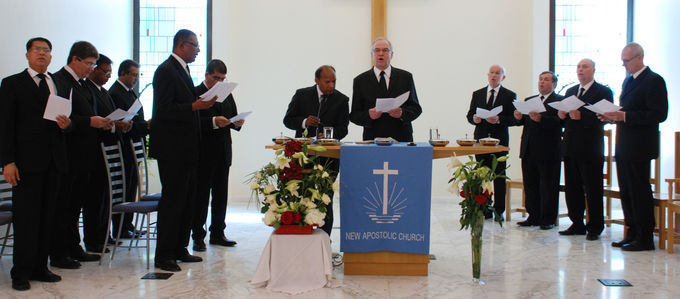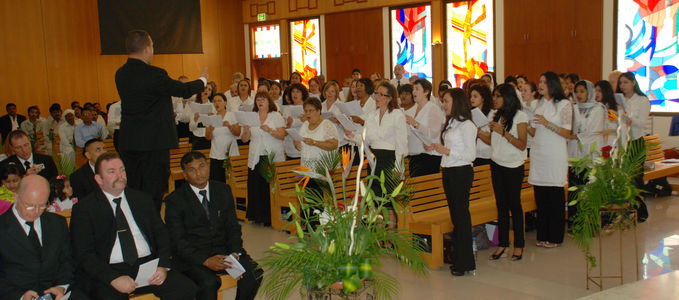
The Chief Apostle’s visit to the United Arab Emirates this coming weekend will fall under the motto “diversity”: many nations in one congregation and many denominations under one roof.
Jebel Ali is the name of the port, in which Jean-Luc Schneider will conduct his first divine service as Chief Apostle in the Persian Gulf region. The countries there are looked after by District Apostle Michael Ehrich. Jebel Ali, once a small coastal village, became one of the world’s ten largest and busiest container ports in the 1970s, and is the world’s largest man-made harbour and the biggest port in the Middle East today. Jebel is Arabic and means “mountain”, Ali means “high or elevated”.
More than 130,000 people work in this free economic zone. Many of them are foreign workers, like in Dubai and many of the other emirates, Bishop (ret.) Rolf Ludwig says. Until recently, he looked after the New Apostolic members in the Persian Gulf region and knows the congregations there.
These expats make up the New Apostolic congregations. Many of the members, the Bishop says, are from Pakistan. “Many work in construction. Most of them are here without their families, and send the greater part of their monthly pay cheque home to support their families─earnings that are well below 1,000 Euros. The divine services for them are held in Urdu. The other expats in the congregation─mostly South Africans, but also Americans, Canadians and Germans─hold jobs at the middle management level.
Common to both groups are the comparatively strict working conditions. Residence permits are issued only for the duration of their employment contract, and that can be terminated at any time with only a few weeks’ notice. That is why the make-up of the congregations is in a constant state of flux.
Not only the local English-speaking congregation is invited to the divine service on 16 January in Jebel Ali, but also the four other congregations from the Emirates Abu Dhabi, Dubai, and Sharjah, as well as from the neighbouring states of Oman, Qatar, Bahrain, and Kuwait. The members from the last four states may have visa difficulties, as they have to travel by air and, depending on their country of origin, may or may not be issued visas.
This being as it is, only the rector of the congregation in Oman will be able to attend the divine service in Jebel Ali, and less than half the members from Bahrain. The congregations of Kuwait and Qatar, on the other hand, will be there almost in full force. The divine service will be held in English and interpreted into Urdu, the national language of Pakistan.
So that the brothers and sisters can come at all, the divine service will take place on a Friday, the official holiday in a Muslim country. Sunday is a normal working day, Rolf Ludwig explains. “Even though Christians are in the minority, they and the members of other religions are treated with a great deal of respect, and are allowed to practise their faith. Like in other Muslim countries proselytizing is prohibited.
The New Apostolic Church does not have its own church building in the Emirates. That is why the services in Jebel Ali take place in the Anglican Church, which is officially allowed to build and maintain its own churches. This is something that goes back to the time of the British protectorate. For the service on 16 January, therefore, a room has been rented in the Christ Church Jebel Ali.
The New Apostolic Church is in good company. Some 30 other denominations from about 15 different countries conduct services under the roof of the Anglican Church. The various denominations have a locker in which they keep the things they need for their services. On some days, from six o’clock in the morning to ten o’clock at night, one denomination after the other celebrates its services on the premises. “This is how up to 30,000 Christians of various denominations gather for worship in such a church complex in the region on one day,” Bishop Ludwig reports.
The fact that the New Apostolic congregation has found a home in the Anglican Church in this case is significant for Rolf Ludwig. After all, the Catholic Apostolic Church developed from this denomination, which in turn is one of the forerunners of the New Apostolic Church.
John Qadir, the local District Evangelist, reports about the general situation of Christians in the United Arab Emirates from the New Apostolic perspective in The National.














